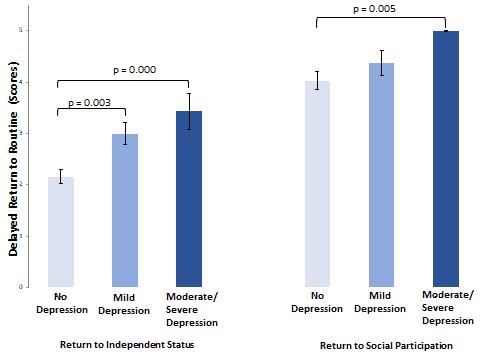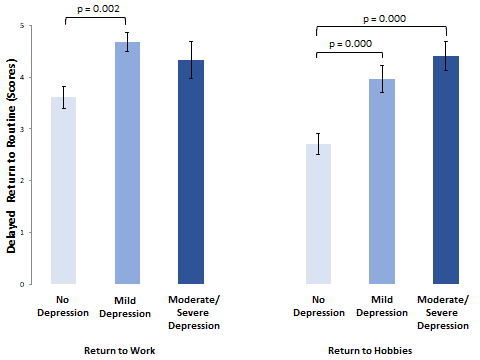
Depression Post Cardiac Surgery is Associated with Delayed Return to Routine and Work
2The Academic College at Wingate, The Academic College at Wingate, Wingate Institute, Netanya, Israel, Israel
3The Azrieli Faculty of Medicine, Bar-Ilan University, Israel
Objective: Depression is prevalent post-cardiac surgery. Patients with high post-operative depressive symptoms may have delayed return to work and routine. The objective of this study was to assess patient’s post-operative depression levels and examine differences in return to routine.
Methods: At 2- and 6-weeks post-surgery, cardiac surgical patients (n=100) were evaluated using a questionnaire that assessed 4 categories of return to routine: work, hobbies, social participation and independent status. Patients were also categorized using the Center for Epidemiological Study of Depression (CES-D) based on 3 levels of depressive symptoms: no depression (CES-D<15), mild depression (CES-D 16-26) and moderate/severe depression (CES-D>27). Differences in delayed return to routine scores in each category were compared among the 3 levels of depressive symptoms.
Results: At 2-weeks post-surgery, delayed return to social participation, hobbies and independent status was highest in patients with moderate to severe depression (p<0.05). At 6-weeks post-surgery, delayed return to social participation, hobbies and independent status was significantly higher in patients with both mild and moderate to severe depression compared to patients with no depression (p<0.05), with no differences between mild and moderate to severe depression groups. Delayed return to work at 6-weeks post-surgery was higher in patients with mild depression compared to patients with no depression (p<0.05). A trend was seen in delayed return to work for patients moderate to severe depression compared to patients with no depression.
Conclusion: Higher levels of depressive symptoms were more likely to delay patient’s return to routine after cardiac surgery. This indicates the need for evaluation of depressive symptoms in patients after undergoing cardiac surgery to ensure successful return to routine.


Figure 1A
Figure 1B
Powered by Eventact EMS